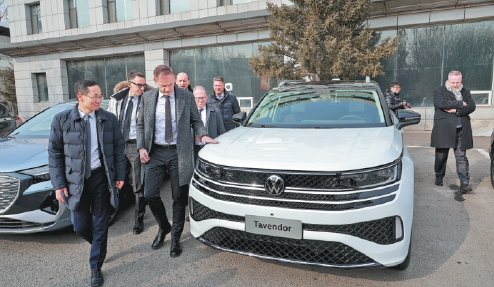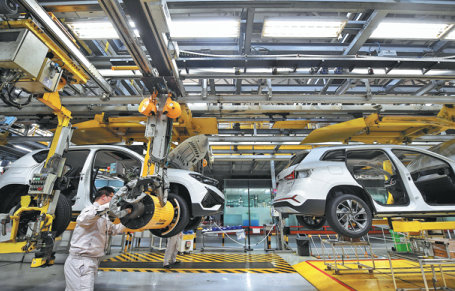German firms confident of China's growth
Favorable policies boost nation's global position and attract international cooperation
China will remain a highly favored investment destination for German companies this year, given its latest policy measures to boost market confidence and efforts to reinforce its position in global industry, innovation and capital chains, said experts and business executives.
While some investments have moved to Southeast Asia due to lower labor costs, they emphasize that this does not conflict with German businesses' investment strategies in China. Rather, these strategies focus on cooperation in high-tech and service sectors, matching China's vision for high-quality growth.
Seeing big opportunities in areas such as carbon neutrality, high-end manufacturing and innovation-driven development, Germany's investment in China amounted to $2.57 billion in 2022, up 52.8 percent on a yearly basis, data from China's Ministry of Commerce showed.
German companies are poised to benefit from China's array of advantages, which encompass a comprehensive industrial system, a thriving market, social stability, and robust long-term economic fundamentals. The rapid advancement of 5G technology and the smooth operation of China-Europe freight train services further contribute to this conducive environment, said Zhao Ping, deputy head of the Beijing-based Academy of China Council for the Promotion of International Trade.
Zhao said that China's commitment to "new infrastructure" investment initiatives, aimed at bolstering industrial upgrades and scientific and technological advancements, has not only stimulated market demand but also fostered a stable environment for production and innovation. These factors collectively serve to facilitate the growth and success of German companies operating in China.
Unlike traditional infrastructure, such as railways, roads and water conservancy, the concept of "new infrastructure" refers to critical facilities based on information technologies like 5G, AI, the industrial internet and the internet of things, which are networks of devices that can connect and exchange data.
Eager to grab a greater market share in China, Rohde& Schwarz, a German manufacturer of test and measurement equipment, plans to bring more air traffic control — or ATC telecommunication — products to China in the next stage.
Stefan Kraemmer, regional area manager of the world market ATC at Rohde & Schwarz, said China is one of the company's key markets, and he is upbeat about the immense growth potential from China's civil aviation market.
"We want to mainly invest in our people, bring them to Europe for training to build up our engineering skills in China, and to do more service activities in China, such as repairing our products, and doing some designs for new projects," said Kraemmer.
He added that the company will introduce some innovative communication suites, such as air traffic control radio technology, to the Chinese market. It has also carried out cooperation with a research institute affiliated with the Civil Aviation Administration of China to prove that the company's products are compliant with related standards.
Founded in 1933, the German company has an extensive sales and service network in more than 70 countries and regions. It has invested heavily in future technologies such as artificial intelligence, the industrial internet of things, 6G, cloud solutions and quantum technology.
Continental, the Hanover-headquartered auto parts supplier, has also accelerated its endeavors to expand business in China, the world's largest vehicle market, with an increasingly localized strategy.
"China is one of the most important growth markets for Continental. We will continue to develop and produce in the market, for the market," said Nikolai Setzer, the group's CEO.
The German group opened its first 5G plant globally in Changsha, capital of Hunan province in late 2022. The factory offers innovative user experience solutions, such as large liquid crystal display or LCD screens, and head-up displays.
Continental outperformed the market in 2022 in China. Thanks to the surge in light vehicle production in China in 2022, the company saw its sales soar by more than 20 percent compared with 2021.
"We still see that the Chinese market is a very important growth market in our portfolio and it grows faster than other markets," said Setzer, adding the company has invested more than 3 billion euros ($3.24 billion) in China over the past decade.
To ease the pressure caused by factors ranging from geoeconomic fragmentation to a gloomy global economic outlook, China has accelerated the pace of further releasing its market potential and smoothed channels for coordination and communication between the government and multinational corporations, said Zhang Fei, deputy director of the Chinese Academy of International Trade and Economic Cooperation's Institute of Foreign Investment.
For instance, the National Development and Reform Commission, China's top economic planner, announced in April that it has been considering shortening the list that outlines sectors that are off-limits to foreign investors.
To attract more global capital, over 20 promotional events will take place throughout this year. These will help foreign investors learn more about China's investment policies, business environment and emerging market opportunities, Shu Jueting, a spokeswoman for the Ministry of Commerce, said recently.
Multinational corporations, including German and other European companies, have been capitalizing on market opportunities and accelerating their investment efforts in China. Specifically, they have shown considerable interest in high-end consumption and manufacturing, healthcare and green sectors, said Sang Baichuan, dean of the Institute of International Economy at the University of International Business and Economics in Beijing.
Looking ahead, Sang expressed his anticipation for a heightened focus on enhancing openness in the services sector and attracting foreign investors to China's coastal areas as well as the central and western regions. This effort would specifically emphasize encouraging investments in trade in services, high-tech industries and labor-intensive sectors, with the objective of fostering stability in foreign direct investment growth.
As many German chemical and automobile companies have been keen to invest in China on a large scale in recent years, Henkel, a German industrial and consumer goods manufacturer, broke ground on a new adhesives technologies manufacturing facility in early June at a chemical industry park in Yantai, Shandong province.
With an investment of approximately 120 million euros, the new plant will enhance Henkel's production capacity of adhesive products in China, and further optimize the supply network to meet growing demand in domestic and international markets, said the German company.
China's actual use of FDI grew by 2.2 percent year-on-year to 499.46 billion yuan ($69.81 billion) in the first four months of 2023, data from the Ministry of Commerce showed.













